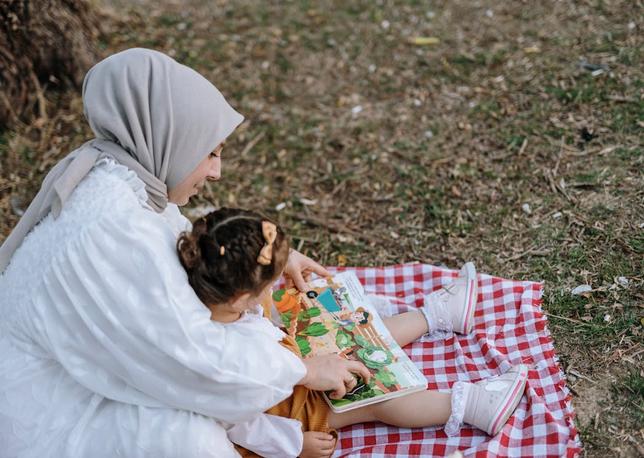Chapter 9: The Role of Family: Honoring Parents, Marriage, and Raising Children
The Islamic Perspective on Family Dynamics, Rights and Responsibilities, and How to Nurture a Home Filled with Love and Respect
Introduction
The family unit is the cornerstone of Islamic society, and its role extends far beyond merely being the first place where individuals are nurtured and raised. It is the foundational space where moral values, ethical standards, and religious teachings are imparted. In Islam, the family is not just a social institution but a sacred trust, a means through which the believer can draw closer to Allah, fulfill their obligations, and live a righteous life. Islam places great emphasis on nurturing a home filled with love, respect, compassion, and support.
The Quran and Hadith provide extensive guidance on the responsibilities of each member within the family, the importance of mutual respect, and the profound impact that a nurturing environment has on the development of individuals and society at large. From honoring one’s parents to maintaining justice and equity in marriage and raising children with love and guidance, Islam provides a comprehensive framework for family life that leads to mutual happiness and spiritual fulfillment.
This chapter explores the Islamic perspective on family dynamics, the rights and responsibilities of family members, and how to create a home that is filled with love, respect, and tranquility.
1. The Significance of the Family in Islam
A. The Family as a Divine Institution
The family is often described in Islamic teachings as a divine institution, established by Allah to maintain the balance of society and to provide individuals with support, love, and guidance. The Quran emphasizes the importance of the family unit as a source of stability, support, and love. Allah says in the Quran:
“And Allah has made for you from the houses a place of rest and made for you from the hides of the animals tents which you find light to carry on your journeys, and from the wool, fur and hair, furniture and goods for a time of comfort.”
(Surah An-Nahl, 16:80)
This verse underscores the importance of the family home as a place of rest, protection, and comfort. It highlights the deep connection between the family structure and the well-being of its members.
The family is a sanctuary, providing emotional and spiritual care, and it is also the first place where a child learns about faith and virtue. The family dynamic is essential to the spiritual, emotional, and physical development of every individual, and it carries significant responsibility for shaping the next generation.
B. Family as a Training Ground for Paradise
One of the most profound perspectives in Islam is that the family is not just an earthly institution, but a pathway to Paradise. The Prophet Muhammad (PBUH) said:
“The best of you are those who are best to their women, and I am the best of you to my women.”
(Sunan al-Tirmidhi)
A well-functioning family, where members treat each other with respect and kindness, becomes a means of earning Allah’s reward. By fulfilling family roles in the manner prescribed by Allah, individuals can accumulate spiritual rewards and strengthen their ties to Allah.
2. Honoring Parents: The Pillar of Family Life
One of the most important elements of family life in Islam is the respect and honor of one’s parents. Islam places immense value on gratitude and obedience to parents, as they are seen as the key to fulfilling one’s obligations towards Allah. The Quran speaks directly about the respect owed to parents:
“And We have enjoined upon man [care] for his parents. His mother carried him with hardship upon hardship, and his weaning is in two years. Be grateful to Me and to your parents; to Me is the [final] destination.”
(Surah Luqman, 31:14)
The above verse emphasizes both the physical and emotional sacrifices parents make in raising their children. The bond between parents and children is portrayed as a divine trust that must be respected.
A. The Duty to Honor and Obey Parents
Honoring parents is one of the most significant duties a Muslim has towards others. The Prophet Muhammad (PBUH) repeatedly emphasized the importance of kindness and obedience to parents, even when they are elderly. In one famous hadith, the Prophet (PBUH) said:
“Your mother, your mother, your mother, then your father.”
(Sahih Muslim)
This hadith underscores the immense sacrifice that mothers make and the unique position of honor they hold in Islam. Even if parents are not Muslims, their rights and the obligation to treat them with kindness and respect remain paramount in Islam.
B. Showing Compassion to Parents in Their Old Age
Islam particularly stresses showing kindness to one’s parents during their old age. As parents age, they often require more support, both physically and emotionally. The Quran advises:
“And lower to them the wing of humility out of mercy and say, ‘My Lord, have mercy upon them as they brought me up [when I was] small.’”
(Surah Al-Isra, 17:24)
This verse highlights the importance of empathy and humility toward one’s parents, recognizing their past sacrifices and praying for their well-being.
3. Marriage in Islam: A Sacred Partnership
Marriage, according to Islamic teachings, is a sacred bond that provides the foundation for the family unit. It is a partnership that goes beyond the physical and emotional aspects of life to encompass mutual respect, love, and spiritual growth. The Quran describes marriage as a sign of Allah’s creation, a source of peace, and a foundation for creating a loving family:
“And of His signs is that He created for you from among yourselves mates that you may find tranquility in them; and He has placed between you affection and mercy. Indeed, in that are signs for a people who give thought.”
(Surah Ar-Rum, 30:21)
A. The Rights and Responsibilities of Spouses
In Islam, both spouses have rights and responsibilities toward one another. These rights are not merely legal obligations but spiritual and moral duties. The Prophet Muhammad (PBUH) emphasized mutual respect, love, and support within the marriage:
“The best of you are those who are the best to their wives.”
(Sunan al-Tirmidhi)
- Husbands are responsible for providing for the material, emotional, and spiritual well-being of their wives. They are expected to be just, gentle, and supportive.
- Wives are responsible for managing the household, supporting their husbands, and caring for the children. They are also encouraged to cultivate love and nurture the spiritual growth of their families.
B. Building a Healthy and Loving Marriage
For a marriage to thrive, both spouses must strive to understand one another, communicate openly, and support each other in fulfilling their Islamic duties. Islam teaches the importance of mercy, patience, and forgiveness in marriage. The Prophet Muhammad (PBUH) said:
“If a man calls his wife to bed but she refuses and causes him to sleep in anger, then the angels will curse her until the morning.”
(Sahih Bukhari)
This hadith highlights the importance of mutual respect, affection, and compromise in marriage. The relationship between husband and wife should be based on deep emotional intimacy, shared responsibilities, and spiritual commitment.
4. Raising Children: The Future of Islam
Raising children in Islam is a significant responsibility, as children are viewed as a trust from Allah. Parents are tasked with providing for their children’s physical needs, nurturing their moral character, and ensuring they receive a proper education—both secular and religious. The Prophet Muhammad (PBUH) said:
“Each of you is a shepherd, and each of you is responsible for his flock.”
(Sahih al-Bukhari)
A. The Importance of Teaching Islam to Children
A key aspect of raising children in Islam is imparting to them the knowledge of Islam—its beliefs, practices, and ethical standards. The Quran emphasizes the duty of parents to educate their children in both worldly and religious matters:
“O you who have believed, protect yourselves and your families from the Fire…”
(Surah At-Tahrim, 66:6)
Teaching children to be conscious of Allah (taqwa), encouraging them to perform regular acts of worship, and instilling in them Islamic values like honesty, compassion, and justice are vital components of raising them in an Islamic home.
B. Discipline with Compassion
While discipline is necessary, Islam encourages parents to raise children with kindness and gentleness. The Prophet Muhammad (PBUH) said:
“Show mercy to those on earth, and you will be shown mercy from above.”
(Sunan At-Tirmidhi)
Disciplining children should be done in a manner that is both firm and compassionate. Punishments should never be excessive, and parents should always seek to correct misbehavior in a way that encourages moral growth.
C. A Balanced Approach to Parenting
Islamic parenting encourages a balanced approach that avoids extremes. Parents must ensure that children have the opportunity to develop their physical health, emotional well-being, and spiritual integrity. This balance fosters well-rounded individuals who can contribute positively to society.
5. Nurturing a Home Filled with Love and Respect
The home in Islam is meant to be a place of peace, love, and mutual support. It is a sanctuary where all members are encouraged to grow spiritually, emotionally, and socially. The Prophet Muhammad (PBUH) said:
“The most perfect of the believers in faith are those with the best character. And the best of you are those who are the best to their women.”
(Sunan al-Tirmidhi)
A. Creating an Atmosphere of Mercy and Compassion
The home should be filled with mercy, where love is expressed freely, and respect is mutual. Parents should strive to be role models of kindness, patience, and understanding, demonstrating affection and tenderness toward one another.
B. Promoting Effective Communication
Communication is key to fostering an atmosphere of love and respect. Open, honest, and empathetic dialogue helps resolve misunderstandings, build trust, and maintain harmony within the family.
Conclusion
The Islamic perspective on family life provides a comprehensive and profound framework that encourages strong, loving, and supportive relationships. By understanding and fulfilling the rights and responsibilities of each family member—whether it is honoring parents, maintaining a strong and just marriage, or raising children with love and guidance—Muslims can create homes that are places of peace, stability, and spiritual growth. The family unit, when guided by Islamic principles, has the potential to serve as a source of blessings, reward, and compassion. Through mutual respect, understanding, and adherence to the principles of Islam, a home can be built that nurtures both the body and soul, leading its members toward Allah’s pleasure and, ultimately, Paradise.


